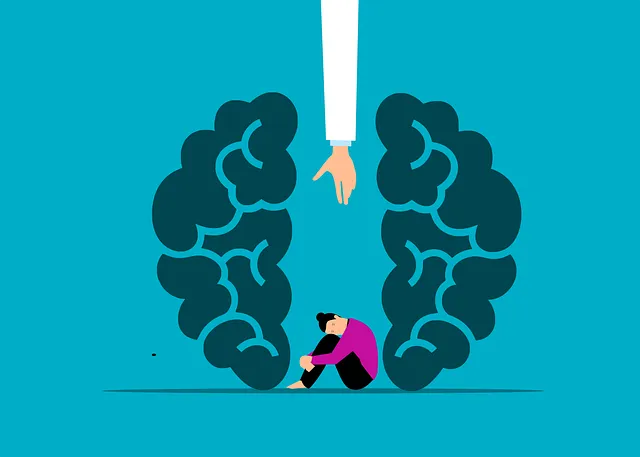Burnout among healthcare providers at facilities like Littleton's Kaiser with inpatient mental health services is a growing concern impacting well-being, patient care, and system performance. Caused by heavy workloads, long hours, and lack of control, it leads to decreased job satisfaction and potential harm to patient safety. Mitigation strategies include Social Skills Training for better communication, prioritizing self-care through Mind Over Matter principles, adopting Crisis Intervention Guidance, and fostering a healthy work-life balance. Enhancing job satisfaction through supportive environments, programs like Mindfulness Meditation, and confidence-building initiatives is crucial. Effective communication, collaboration, and teamwork reduce burnout rates by alleviating workload pressures and improving patient outcomes.
Healthcare provider burnout is a growing concern, with significant implications for patient care and facility reputation. This article explores comprehensive strategies to prevent burnout among healthcare professionals, focusing on Littleton and Kaiser’s potential approaches. We delve into understanding burnout’s root causes, from long hours to emotional demands, and highlight essential interventions. By prioritizing work-life balance, enhancing job satisfaction through supportive environments, fostering effective communication, and promoting teamwork, healthcare organizations like Kaiser can mitigate burnout, ensuring staff resilience and improved patient outcomes, even in challenging settings like inpatient mental health care in Littleton.
- Understanding Burnout Among Healthcare Providers: Causes and Effects
- Strategies for Work-Life Balance: Prioritizing Self-Care
- Enhancing Job Satisfaction: Building a Supportive Environment
- Effective Communication and Collaboration: Teamwork for Resilience
Understanding Burnout Among Healthcare Providers: Causes and Effects

Burnout among healthcare providers is a growing concern, impacting not only individual well-being but also patient care and overall healthcare system performance. It’s essential to recognize that burnout isn’t merely fatigue; it’s a complex state resulting from prolonged exposure to stressful work environments. Healthcare professionals, including those at facilities like Littleton and Kaiser with inpatient mental health services, face unique challenges such as heavy workloads, long hours, and high-stress situations.
The causes of burnout are multifaceted. Excessive workload, lack of control over one’s job, insufficient rewards, and a mismatch between personal values and work values are significant contributors. The effects are profound: from decreased job satisfaction and increased rates of depression and anxiety (Depression Prevention, Anxiety Relief), to potential harm to patient safety and reduced quality of care. Social Skills Training can be beneficial in fostering better communication and reducing conflicts that may arise from the high-pressure environment, thereby mitigating burnout risks.
Strategies for Work-Life Balance: Prioritizing Self-Care

In the fast-paced world of healthcare, burnout is a significant concern for providers, especially those working in demanding environments like inpatient mental health facilities, such as Littleton’s Kaiser. To combat this, prioritizing self-care is paramount and forms a cornerstone of any effective burnout prevention strategy. Healthcare professionals must understand that taking time for themselves isn’t selfish; it’s essential for their well-being and the quality of care they can offer.
Adopting Mind Over Matter principles can significantly enhance resilience to stress. This involves dedicating consistent time for activities that boost confidence and promote mental clarity, like exercise, mindfulness practices, or pursuing hobbies. Additionally, accessing Crisis Intervention Guidance tailored for healthcare workers can equip them with tools to manage overwhelming situations and prevent burnout. By fostering a healthy work-life balance, professionals in the field can ensure they are present and engaged both personally and professionally.
Enhancing Job Satisfaction: Building a Supportive Environment

Enhancing job satisfaction among healthcare providers is a key strategy to prevent burnout and promote long-term well-being, especially in demanding settings like inpatient mental health care. At facilities such as Kaiser in Littleton, creating a supportive environment can make a significant difference. This involves fostering an atmosphere of respect, open communication, and collaboration among staff members. Encouraging teamwork and recognizing individual contributions can boost morale and create a sense of belonging.
Additionally, implementing programs that support mental health and well-being is vital. Activities like Mindfulness Meditation have been shown to reduce stress and improve focus, benefiting both the mind and body. Confidence-boosting initiatives and training in Mind Over Matter principles can empower healthcare providers to manage challenging situations more effectively, ultimately enhancing their job satisfaction and overall resilience.
Effective Communication and Collaboration: Teamwork for Resilience

In healthcare settings, effective communication and collaboration are powerful tools to combat burnout among providers. Teamwork fosters a supportive environment where professionals can share knowledge, offer emotional support, and alleviate workload pressures. When healthcare teams work cohesively, they enhance patient care, improve outcomes, and build resilience against stress. This collaborative approach is especially beneficial for mental health units like those found at Kaiser in Littleton, where inpatient care requires continuous communication to manage complex cases effectively.
By promoting open dialogue, active listening, and mutual respect, healthcare providers can create a culture of support that extends beyond administrative tasks. Encouraging team members to share their experiences, challenges, and successes related to Anxiety Relief and Depression Prevention strategies can foster a sense of community and reduce feelings of isolation. Moreover, integrating Self-Care Routine Development for Better Mental Health as a core value in these collaborative efforts empowers staff to prioritize their well-being, leading to improved job satisfaction and reduced burnout rates.
Burnout among healthcare providers is a pressing issue, but with the right strategies, it can be mitigated. By prioritizing self-care through effective work-life balance, organizations like Kaiser in Littleton can enhance job satisfaction and create a supportive environment. Open communication and collaboration foster teamwork, building resilience within the workforce. Implementing these measures can not only prevent burnout but also improve patient care by ensuring healthcare providers are at their best, both physically and mentally.






